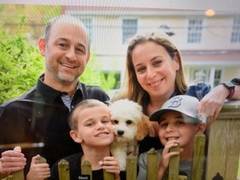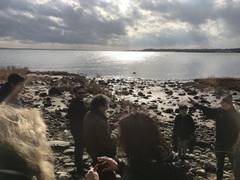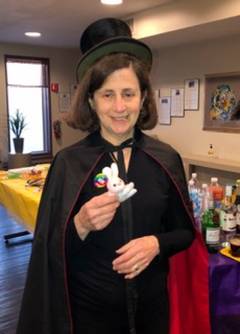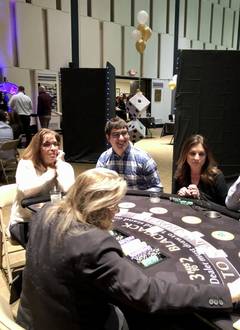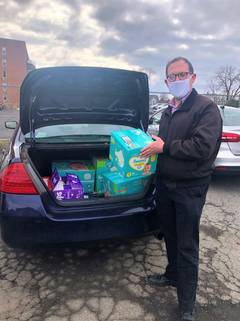Rosh Hashanah Day 1: Ancestral Merit
09/12/2018 02:30:09 PM
| Author | |
| Date Added | |
| Automatically create summary | |
| Summary |
This morning, as I lead this community for the first time on the holidays, I want to continue to introduce myself to you by sharing one of my most precious memories.
When I was a little boy, I would go with my father and much of his extended family to visit his grandfather, Samuel Goldberg, whom I called Pop's Pop. Pop's Pop was well into his 90's then, and he lived in a Jewish nursing home in Philadelphia. It so happened that most his brothers and his wife's siblings also spent their last years there. So it frequently transpired that the entire extended family of three or four generations would gather in the lobby on Sunday afternoons. Sometimes we would assemble in the small chapel and my twin brother and I would sing songs we had learned in synagogue from the bimah. And what do you know? He's a cantor and I'm a rabbi.
When I was five or six, I had begun taking piano lessons. One of the first songs I learned to play was the Yiddish folksong Tumbalalaika. Perhaps you know it. [Sing]:
Tumbala, Tumbala, Tumbalalaika, Tumbala, Tumbala, Tumbalalaika Tumbalalaika, shpil balalaika, Tumbalalaika, freylekh zol zayn
On one long Sunday visit to Pop's Pop, I grew bored. So I walked to the upright piano in the lobby and started to play Tumbalalaika. Pop's Pop heard the song and came right over, all excited. He looked at me and started to sing a long for a bit. We had a precious moment of connection.
There was so much that separated us, even though we were family. Pop's Pop was born in Poland and came to this country as a teenager. He hustled and saved, opening a corner grocery store in what was otherwise a working-class Irish Catholic neighborhood. He had lived through raising sons in the Depression, sending them to fight in WWII and the Korean War, closing his store after decades and burying his beloved wife of more than 65 years just a few years earlier.
I, by contrast, was a little pisher, a kid who grew up speaking English in the suburbs as a fifth-generation American. Yet despite all of these differences in life experiences, we had that beautiful moment of continuity. He had seen the world change in many ways during his long life. Lots had been lost along the way. But something about how I was growing up was recognizable to him. Some things were nonetheless passed down through the generations. I'd like to think that through me, he could see that all of his hard work and sacrifice had been worth it.
I think about Pop's Pop all of the time. I wonder what he would think of me today. I consider the ways that he would feel totally at home, but also totally bewildered by the way I practice Judaism. He represents to me a connection to the Jewish past and to the Yiddish-speaking world of my European forbears. Part of my connection to Judaism comes out of a desire to tap in to this chain of tradition and my own roots.
I look to my ancestors, both the ones like Pop's Pop who I knew and the many that I did not, for inspiration and guidance. I know that I owe them so much. I want to make them proud. I also know that Judaism and Jewish community guided them through their toughest moments, which gives me the faith that Judaism can do the same for me, if I let it.
There's a similar concept in Jewish theology that I'd like to address today, called zechut avot, or merit of the ancestors. Zechut avot kind of works like a bank account. Our ancestorsâ€"which in this case refers to Abraham, Isaac, Jacob and their wives, along with our other biblical forbearsâ€"were extraordinary individuals who received a surplus of rewards for their good deeds. They put that extra merit in an account that we, their descendants, have inherited. So, when our own spiritual accounts are overdrawn, we can rely on the inherited merit from our ancestors to make up the difference.
So, when we turn to God, especially on the high holidays, with requests for mercy and forgiveness, we do not do so only on the basis of our own good deeds. That wouldn't be sufficient; as we hyperbolically say in Avinu Malkeinu, ki ayn banu ma'asim, we have no good deeds on which to base our appeal. So we appeal as well to the great merit of our ancestors that we've inherited. We may not be worthy, we say to God, but with an extra boost from our ancestors, we might just deserve some Divine mercy.
This concept has roots in the Torah. As you might recall, after the sin of the Golden Calf, God seeks to destroy the whole people in response to their disloyalty. Moses pleads with God, “Remember Your servants, Abraham, Isaac and Israel, how You swore to them by Your Self and said to them: I will make your offspring as numerous as the stars of heaven” (Exodus 32:13). God remembered the covenant and the excellence of these individuals and relented.
This concept also appears at major moments in our prayers. We begin each Amidah, each standing prayer, with a paragraph that situates us as praying to the “God of Abrahram, the God of Isaac and the God of Jacob,” and today we also mention their wives as well. In that paragraph, we say that God is zocher hasdei avot, that God remembers the loving deeds of our ancestors. We begin the prayer this way because any request that we might make of God is rooted, at least in part, in the notion that our pious ancestors' deeds accrue some merit to us.
Already in the rabbinic period, though, this concept was controversial. The Talmud (Shabbat 55a) records a dispute between two rabbis. One holds that ancestral merit is still active and that God will have mercy on the righteous because of it. The other holds that that the merit of the ancestors has ceased to operate. To go back to our bank metaphor, the second rabbi seems to think that we did inherit such an account. But it too has become overdrawn due to our many sins, such that it is no longer of use. One medieval rabbi (Rabbeinu Tam, Tosafot on Shabbat 55a) helpfully synthesized the two positions: the bank account of our ancestors' merit is itself long overdrawn, but the covenant they made with God is still in effect, and it is to this that we refer when the concept appears in the liturgy.
More than any other holiday, Rosh Hashannah is the holiday in which we call upon our ancestral merit. Our Torah readings focus on the all-too human stories of our ancestors Abraham, Sarah and Isaac, concluding with the dramatic story of the binding of Isaac. In the rabbinic imagination, this episode is the most significant deposit our ancestors made in the account that they've passed on to us. Abraham's willingness to sacrifice his son, and Isaac's seeming consent to be sacrificed, is the ultimate meritorious act that they passed along to their descendants.
This notion found its way into our Rosh HaShannah liturgy. One of the three special sections of the Musaf service is called Zichronot, or memories. In it, the mahzor quotes 10 verses describing how God keeps in mind the meritorious actions of our ancestors. That section of the liturgy mentions God's remembrance of many of our ancestors, including Noah, Abraham, Jacob and the people Israel as a whole.
But this section of the liturgy specifically implores God to remember Abraham's near-sacrifice of Isaac as a merit for his children living today. Why does the liturgy focus specifically on the merit of Isaac? Why is that the Torah reading for this day?
A rabbinic legend (Shabbat 89a) imagines that God calls upon the three patriarchs in Heaven to defend the Jewish people against the claim that they should be eradicated as punishment for their own sins. Shockingly, both Abraham and Jacob argue that we should be eradicated in order to sanctify God's name.
Only Isaac makes an extended case to God on our behalf. First, he argues that we are also God's children, not only Isaac's, so that God bears some responsibility as well. Then, Isaac negotiates down the amount of time individuals are culpable for their sins from a full lifespan to only a few years.
Isaac then declares that his own near-sacrifice should atone for the people's sins. Isaac knew from his own experience the terror of being asked to sacrifice oneself for the sanctification of God. For this reason, unlike his father and son, Isaac robustly argues on the Jewish people's behalf, ensuring that his descendants will not have suffer what he suffered. Isaac's own near-sacrifice compensates for the punishment the Jewish people deserve, but will not receive.
This idea may strike us as strange or even un-Jewish. After all, there's another religion out there based on the idea of one extraordinary person's sacrifice vicariously atoning for everyone. As I mentioned, even in the rabbinic period this concept was disputed. It never became central to Jewish theology even as it never totally disappeared either. So how can we understand the idea of zechut avot today?
Contemporary Jewish thinkers tend to reject the bank metaphor of inherited merit. And for good reason: taken to its logical conclusion, one could mistakenly think that our noble ancestry gives us license to act recklessly, relying on our great ancestors to make up for it spiritually. Think of the irresponsible children of wealthy and powerful people, who were never held accountable for their actions and therefore think they have permission to do as they please. We certainly want to avoid that.
Yet contemporary thinkers also insist that our ancestry matters. We are not just anyone, and we do not come from just anywhere. One contemporary rabbi explains that thinking about our ancestors' merit means that we are “standing on the shoulders of those who came before us… We are not given an entitlement just because our ancestors, Biblical and familial, did some amazing things. But their deeds are the shoulders on which we stand so we can see into the promised land.”
Likewise, Rabbi Jonathan Sacks reminds us that, “we are who we are because of who came before us…to be a Jew is to be part of the strangest, oldest, most unexpected and counter-intuitive story there has ever been: the story of a tiny people, never large and often homeless, who nonetheless outlived the greatest empires the world has ever known…Each in turn thought itself immortal. Each has gone. The Jewish people still lives….We do not start with nothing.”
This means that when I pray, I do not merely pray to my own God. I pray to the God of Abraham, Isaac and Jacob, of Sarah, Rebecca, Rachel and Leah. To the God of Moses and Miriam and David and Solomon and Ruth and Esther. To the God of Hillel the Elder and Rabbi Akiva. To the God of Maimonides and Rashi. To the God of Moses Mendelssohn and Franz Rosenzweig and Abraham Joshua Heschel and Mordecai Kaplan. And yes, to the God of my Pop's Pop and my other ancestors of blessed memory. I do not approach God alone, but standing on the shoulders of many, many people whose lineage I am humbled to claim.
So what does this all have to do with us in Port Chester in 2018? We at KTI are blessed to have our own marvelous inheritance, our own ancestral merit. This congregation traces its roots back to a gathering that happened 130 years ago today, the first day of Rosh Hashannah, September 19, 1887. A group of twenty local Jews gathered on Pemberwick Road in what was then called East Port Chester to celebrate the new year. As the Jewish population of Port Chester, then a thriving industrial town, grew, the synagogue formerly incorporated in 1891 and built their first structure.
Other Jewish institutions followed in the coming years and decades: a breakaway congregation that eventually merged back in to form KTI; mutual aid and charitable organizations; schools and youth activities; a Jewish Center on Willett Avenue that served the community from 1929 to 1979. Eventually, the community moved to this location and magnificent building designed by the renowned architect Phillip Johnson. Finally, the many graves in our cemetery give silent testimony to the lives of the many people who made up this community over the years.
So as we gather here this morning, we are but the latest iteration of this community as it has existed for 13 decades. Some of us have deep roots here, with families ties to KTI going back two or three or four or even more generations. Others, like me, are more newly arrived. But we all benefit from the tremendous legacy left by those who came before us. Generations of congregants' time, talent and treasure have left us with the synagogue we can enjoy today.
Our legacy matters. We wouldn't be who we are without it. But alone, it is not sufficient to sustain our Jewish lives. We cannot simply rely on our past achievements to take us into the future. As well-established as we are, we are also constantly changing as people come and go and find new or different ways to connect to the synagogue and to Jewish life.
Our ancestors, both here at KTI specifically and through our Jewish heritage generally, left amazing things for us. But it's our responsibility to give the time and effort to claim them. My hope over the next years is that together we can continue to explore our marvelous inheritance, our zechut avot. I hope through my teaching and leadership of the community to continue to show you some of the treasures I've found left for me.
But here's the thing: like anything else worthwhile, claiming our zechut avot, our ancestral merit, takes effort. So my hope is that as this community begins a new chapter, you will each find new ways to get involved. I hope to see as many of you as possible at our services and regular and special events. I promise to make the experience as accessible and interesting as I can. I also hope to hear from you in the coming year what you are looking for in your Jewish experience. What gap in your lives can the synagogue fill? How can we work together to make KTI into a thriving, purpose-driven, holy community?
I get it. I know everyone is busy and has lots of demands on their time and attention. But like anything else, the more you put in to your Jewish experience, the more you will get out of it. There are no shortcuts to a fulfilling Jewish experience and vibrant community.
But we do have our tremendous legacy on which to draw. And most importantly, we have each other. May this Rosh Hashannah begin a new year full of Jewish possibilities for us as individuals and as a community. Shana tova.
Sat, November 8 2025
17 Cheshvan 5786
Photo Gallery
Photo Albums
Upcoming Events
-
Friday ,
NovNovember 14 , 2025Give Thanks at Tot Shabbat 2025
Friday, Nov 14th 5:30p to 6:30p
-
Tuesday ,
NovNovember 18 , 2025Women's Rosh Chodesh Group
Tuesday, Nov 18th 12:00p to 1:30p
New Women's Rosh Chodesh Group Tuesdays, 12:00-1:30pm Gather with Cantor Sklar and KTI friends at the start of each month of the Hebrew calendar to learn about the themes and traditions of the coming month. Learn from each other, learn more about each other and better understand the women within our tradition. Enjoy music and lunch together! Please a dairy or parve lunch to enjoy at noon, followed by the discussion at 12:30pm. KTI will provide drinks and dessert. RSVP Appreciated -
Wednesday ,
NovNovember 19 , 2025Rabbi, May I? Modern Responsa
Wednesday, Nov 19th 10:00a to 11:30a
Wednesdays, 10 - 11:30 AM, KTI Library Ever since Abraham’s famous argument with God, Judaism has been full of debate. Moses and Korah, David and Nathan, Hillel and Shammai, the Vilna Gaon and the Ba’al Shem Tov, Spinoza and the Amsterdam Rabbis . . . the list goes on. No wonder that Judaism cherishes the expression machloket l’shem shamayim, “an argument for the sake of heaven.” Beyond their historical importance, what makes these disputations so compelling is that nearly all of them, regardless of their epochs, are still being argued. The parade of characters spanning three millennia of biblical, rabbinic, and modern disputation reflects the panorama of Jewish history with its monumental political, ethical, and spiritual challenges. This series will examine Jewish responses to exile from the biblical period to our modern day. Considering texts from all genres of Jewish literary creativity, we will explore how the realities and iterpretaions Join as we re-open these timeless debates that lead us to the core of 3,000 years of Jewish conversation. • Justice: Abraham vs. God (October 19) • Holiness and Authority: Moses vs. Korah (November 9) • Inclusion: The Five Daughters vs. the Twelve Tribes (November 30) • Accountability and Morality: David vs. Nathan (December 21) • Resistance: Ben Zakkai vs. the Zealots (January 18) • Law: Hillel vs. Shammai (February 15) • Spirituality: The Vilna Gaon vs. the Baal Shem Tov (March 15) • Boundaries: Spinoza vs. the Amsterdam Rabbis (April 19) • Religious Evolution: Geiger vs. Hirsch vs. Frankel (May 10) • Zionism: Herzl vs. Wise (May 31) -
Wednesday ,
NovNovember 19 , 2025Wrestling with God
Wednesday, Nov 19th 8:00p to 9:30p
Wrestling with God Wednesdays, 8-9:30 PM Congregants’ homes TBA We need to talk about God. And about how we talk, and don’t talk, about God. It’s a big topic, maybe the biggest. This offering invites adult learners into compassionate inquiry, deepening their relationship to Jewish text through collective exploration. Using the album s*ngs ab-ut g?d [https://open.spotify.com/album/6JEY2AN6awAxNfWwmXX460] by Jewish educator Eliana Light as a starting point, this series blends music, Hebrew text study, and open-ended questions to help participants examine their own connections to the divine. This is sacred work. It’s not about getting it right. It’s about showing up with curiosity, humility, and a willingness to join the long lineage of Jews who wrestle with God. Each session stands alone, but we’d love to have a consistent group as much as possible. Dates: September 10: skyman October 22: shadows November 19: in the silence December 10: if only January 21: lead me back February 11: three steps March 11: beyONEd April 29: the mountains May 20: the name June 17: I rise -
Thursday ,
NovNovember 20 , 2025Coffee with the Rabbi
Thursday, Nov 20th 8:00a to 9:00a
Start your morning with some caffeine and casual or meaningful conversation! Join Rabbi Goldberg for a Coffee Chat! Stop by Rye Ridge Starbucks any of the following Thursdays, between 8-9am: June 12 and 26 July 10 and 24 August 7 and 21 September 4 and 18 October 16 and 30 November 6 and 20 December 4 and 18
Privacy Settings | Privacy Policy | Member Terms
©2025 All rights reserved. Find out more about ShulCloud

